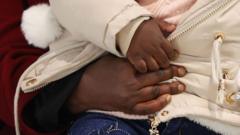Authorities claim support for migrants poses a threat to national stability amidst ongoing humanitarian crises.
Libya Orders Expulsion of Aid Groups Over Demographic Allegations

Libya Orders Expulsion of Aid Groups Over Demographic Allegations
Accusations against humanitarian organizations cited as attempts to alter Libya’s demographic structure.
Libyan authorities have issued a dramatic directive expelling several aid organizations accused of conspiring to alter the country’s ethnic composition. Citing a supposed plan to encourage African migrants to remain in Libya, leading to a demographic shift, the Internal Security Authority singled out ten groups, including Doctors Without Borders, the UN refugee agency, and the Norwegian Refugee Council, demanding they cease operations immediately.
Spokesman Salem Gheit articulated the government's concern, stating, "This plan to settle migrants of African origin in our country represents a hostile act. It aims to change the demographic composition of the country and threatens the balance of Libyan society." This announcement bears resemblance to a controversial statement from Tunisia two years prior, which was widely condemned as an expression of anti-black racism. Both Libya and Tunisia serve as crucial transit nations for African migrants attempting to reach Europe.
Since the fall of Muammar Gaddafi's regime in 2011, Libya has faced significant governmental fragmentation, with rival administrations battling for control. The resulting power vacuum has permitted the proliferation of militia groups and human trafficking networks. Migrants have frequently reported harrowing conditions, citing abuse and mistreatment in detention centers run by armed groups, including allegations of death and starvation.
The internationally recognized government based in Tripoli issued the expulsion order. In light of this, Doctors Without Borders (MSF) had already suspended its operations a week prior, reporting harassment from local authorities targeting NGO staff.
Responding to the government's actions, the UNHCR defended its mission, clarifying that it assists refugees who are desperately in need, not illegal migrants promoting settlement in Libya. Spokesman William Spindler reassured that the agency has maintained partnerships with Libyan authorities for over three decades, providing critical support for vulnerable populations, including asylum-seekers and Libyan communities in distress.
The Libyan government’s allegations against the aid organizations also included claims that their assistance, which encompasses food, clothing, and medical care, has led some migrants to view Libya as a permanent home rather than merely a transit country. However, many migrants assert their desire to leave Libya due to the horrific abuse they face.
Numerous reports highlight the abhorrent conditions sub-Saharan African migrants endure, including severe human rights violations such as killings, enslavement, and sexual violence. A Sudanese woman described her experience in Libya, revealing the appalling reality of being dehumanized and assaulted, while poignantly questioning the identity of her tormentors: “Even kids here are mean to us, they treat us as beasts and sorcerers, they insult us for being black and African, are they not Africans themselves?”
Spokesman Salem Gheit articulated the government's concern, stating, "This plan to settle migrants of African origin in our country represents a hostile act. It aims to change the demographic composition of the country and threatens the balance of Libyan society." This announcement bears resemblance to a controversial statement from Tunisia two years prior, which was widely condemned as an expression of anti-black racism. Both Libya and Tunisia serve as crucial transit nations for African migrants attempting to reach Europe.
Since the fall of Muammar Gaddafi's regime in 2011, Libya has faced significant governmental fragmentation, with rival administrations battling for control. The resulting power vacuum has permitted the proliferation of militia groups and human trafficking networks. Migrants have frequently reported harrowing conditions, citing abuse and mistreatment in detention centers run by armed groups, including allegations of death and starvation.
The internationally recognized government based in Tripoli issued the expulsion order. In light of this, Doctors Without Borders (MSF) had already suspended its operations a week prior, reporting harassment from local authorities targeting NGO staff.
Responding to the government's actions, the UNHCR defended its mission, clarifying that it assists refugees who are desperately in need, not illegal migrants promoting settlement in Libya. Spokesman William Spindler reassured that the agency has maintained partnerships with Libyan authorities for over three decades, providing critical support for vulnerable populations, including asylum-seekers and Libyan communities in distress.
The Libyan government’s allegations against the aid organizations also included claims that their assistance, which encompasses food, clothing, and medical care, has led some migrants to view Libya as a permanent home rather than merely a transit country. However, many migrants assert their desire to leave Libya due to the horrific abuse they face.
Numerous reports highlight the abhorrent conditions sub-Saharan African migrants endure, including severe human rights violations such as killings, enslavement, and sexual violence. A Sudanese woman described her experience in Libya, revealing the appalling reality of being dehumanized and assaulted, while poignantly questioning the identity of her tormentors: “Even kids here are mean to us, they treat us as beasts and sorcerers, they insult us for being black and African, are they not Africans themselves?”




















